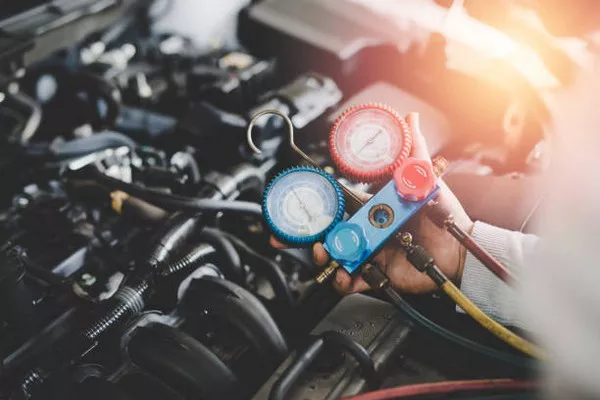A vehicle’s air conditioning (AC) system is crucial for providing comfort to drivers and passengers, especially in hot weather. However, the components of this system, particularly the AC compressor, play a vital role in the vehicle’s overall functionality. Many car owners often overlook the potential impacts of a faulty AC compressor on their vehicle’s performance, including the possibility of stalling. This article explores how a malfunctioning AC compressor can affect engine performance and potentially lead to stalling.
Understanding the AC Compressor
The AC compressor is the heart of the air conditioning system. It is responsible for compressing and circulating refrigerant, which cools the air before it is sent into the cabin. The compressor is driven by a belt connected to the engine, typically the serpentine belt. When you activate the AC, the compressor engages, pulling power from the engine.
A properly functioning compressor ensures that the refrigerant flows efficiently throughout the AC system, allowing for effective cooling. Conversely, a malfunctioning compressor can lead to various issues, affecting not only cabin comfort but also the engine’s performance.
How a Bad AC Compressor Works
When the AC compressor fails, it can manifest in several ways, including:
Increased Load on the Engine: A faulty compressor may seize or become inefficient, putting excessive load on the engine. The engine has to work harder to drive the compressor, which can lead to a drop in engine performance.
Fluid Leaks: A failing compressor may leak refrigerant or oil, which can affect the engine’s lubrication system if the leak is severe. This can lead to increased friction and heat, potentially resulting in engine damage.
Electrical Issues: Modern vehicles often have electronic AC compressors that can malfunction, leading to erratic performance. Electrical issues can create additional load on the engine’s electrical system, affecting its overall operation.
Unusual Noises: A failing compressor may produce grinding, squealing, or rattling noises. These sounds can indicate internal damage, which can affect the belt system and create further strain on the engine.
The Connection Between a Bad AC Compressor and Engine Stalling
While a faulty AC compressor does not directly cause a car to stall, its malfunction can contribute to conditions that may lead to stalling. Here are several ways this can happen:
1. Increased Engine Load
When the AC compressor fails, it can create a significant load on the engine. If the compressor seizes, it can cause the engine to struggle, especially during idling or when the vehicle is at low speeds. An overloaded engine can experience a drop in RPM (revolutions per minute), leading to stalling, particularly if the driver is making sharp turns or coming to a stop.
2. Electrical Drain
In vehicles with electronically controlled AC compressors, a malfunction can lead to excessive electrical drain on the vehicle’s battery and alternator. If the electrical system becomes overburdened, it can cause the engine to stall, especially when idling or under low power conditions.
3. Overheating
A bad AC compressor can also lead to engine overheating. If the compressor’s internal components break down, they may produce excess heat, which can spread to the engine. Overheating can cause the engine to enter a failsafe mode or even shut down to prevent damage, leading to stalling.
4. Fluid Contamination
If the AC compressor leaks refrigerant or oil, it may contaminate the engine’s oil supply. Contaminated oil can lead to inadequate lubrication, causing the engine to overheat or seize. This could result in engine stalling or even severe engine damage.
Signs of a Failing AC Compressor
Recognizing the signs of a failing AC compressor can help prevent potential engine issues. Some common symptoms include:
Poor Cooling Performance: If the AC is not cooling effectively, it may indicate a compressor issue.
Unusual Noises: Grinding or rattling sounds can signal internal damage.
Fluid Leaks: Puddles of refrigerant or oil under the vehicle may indicate a problem.
Increased Engine Load: A noticeable decrease in acceleration or power while the AC is running can signal a compressor issue.
Electrical Malfunctions: Warning lights on the dashboard may indicate electrical issues tied to the AC system.
Preventive Measures and Solutions
To mitigate the risks associated with a failing AC compressor, consider the following preventive measures:
Regular Maintenance
Scheduled Inspections: Regularly inspect the AC system during routine maintenance. Look for signs of wear on the serpentine belt and other components.
Refrigerant Levels: Ensure that the refrigerant levels are adequate and that there are no leaks in the system.
Addressing Issues Promptly
Immediate Repairs: If you notice any signs of a failing AC compressor, have it inspected and repaired promptly to prevent further damage to the engine.
Professional Assistance: Consult with a qualified mechanic for a thorough diagnosis and repair of any AC system issues.
Understanding Load Management
Turning Off AC When Needed: If you notice that your vehicle struggles to accelerate or maintain power, consider turning off the AC, especially during heavy loads like climbing hills or during stop-and-go traffic.
See Also The Value of a 150 PSI Air Compressor
Conclusion
While a bad AC compressor may not be a direct cause of a car stalling, its impact on engine performance can create conditions that lead to stalling. Increased engine load, electrical drain, overheating, and fluid contamination are all factors that can result from a malfunctioning compressor. By understanding the relationship between the AC system and engine performance, drivers can take proactive steps to maintain their vehicles and prevent potentially dangerous situations on the road.
Regular maintenance, prompt attention to warning signs, and understanding how to manage load can help mitigate the risks associated with a failing AC compressor. Ultimately, staying informed and vigilant about your vehicle’s health will ensure a safer and more enjoyable driving experience.
You Might Be Interested In

